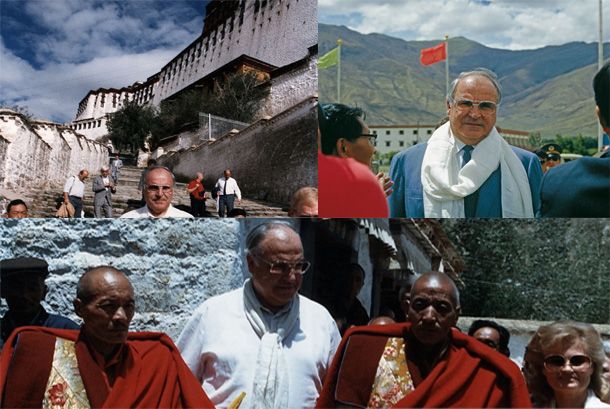 San Diego, CA, USA — The spiritual leader of Tibet His Holiness Dalai Lama has expressed sadness over the demise of Helmut Kohl and has conveyed his condolences to Kohl's family.
San Diego, CA, USA — The spiritual leader of Tibet His Holiness Dalai Lama has expressed sadness over the demise of Helmut Kohl and has conveyed his condolences to Kohl's family.
His Holiness the Dalai Lama wrote to Mrs Maike Kohl-Richter this morning to express his sadness on hearing that Chancellor Helmut Kohl has passed away.
In a condolence message, the spiritual leader referred to Helmut Kohl as a visionary leader and statesman and told her he offered prayers on the late Chancellor's behalf and would like to convey his condolences to her and the members of her family.
"I had great admiration for Chancellor Kohl's steady leadership when the Cold War came to a peaceful end and the re-unification of Germany became possible," he wrote.
"Like him, I am also an enthusiastic admirer of the spirit of the European Union, which was founded to promote the common interest ahead of individual nation's concerns. This Union has delivered more than six decades of peace, reconciliation and prosperity in Europe."
The Nobel Peace Prize Laureate concluded that the best tribute we can pay to such leaders as Chancellor Kohl is to carry their vision forward and work to inspire future generations so the EU continues to serve as a model of unity and strength in times to come.
German Chancellor Angela Merkel on Sunday honored the late Helmut Kohl, describing him as a "great German and a great European."
In the book, Merkel wrote that Kohl "made an almost unparalleled contribution" to German reunification as well as understanding across Europe.
"In Helmut Kohl, we have lost a great German and a great European," Merkel wrote on Sunday. "He made an almost unparallel contribution to the restoration of our country's unity and to European harmony."
Kohl, towering postwar figure who reunified Germany after 45 years of Cold War antagonism, propelled a deeply held vision of Europe's integration and earned plaudits from Moscow and Washington for his deft handling of the fall of the Berlin Wall, died on Friday June 16, 2017 at his home in Ludwigshafen, Germany, the Rhine port city where he was born. He was 87.
He led Germany for 16 years as chancellor, from 1982 to 1998, a crucial era in contemporary German and European history in which he oversaw German reunification and pushed for the creation of the common European currency, the euro.
Kohl's role in the shaping the European Union will also be honored with a special commemoration that is expected to include a memorial service and a tribute from all EU member state leaders
Jean-Claude Juncker, the president of the European Commission, told the German Bild am Sonntag newspaper on Sunday that Kohl deserved the unprecedented honor because he was one of only three European honorary citizens, alongside the bloc's founding father, Jean Monnet and former Commission President Jacques Delors, Juncker said.
President Emmanuel Macron of France praised Mr. Kohl for his role both in unifying Germany and in solidifying Franco-German friendship. "We lose a great European," he said in a message in German on Twitter.
In July 1987, the German Chancellor, Kohl, on his second or third official visit to China suddenly paid Tibet an official visit. Later Kohl’s wife revealed a little secret, namely that Tibet had always been Kohl’s dream. He read Heinrich Harrer's book titled: “Seven Years in Tibet”, when he was young and was totally fascinated by it, which is why he had to visit Tibet in his lifetime no matter what, even at the expense of affecting the Sino-German relationship.


![Tibet has a rich history as a sovereign nation until the 1950s when it was invaded by China. [Photo: File]](/images/stories/Pics-2024/March/Tibet-Nation-1940s.jpg#joomlaImage://local-images/stories/Pics-2024/March/Tibet-Nation-1940s.jpg?width=1489&height=878)















